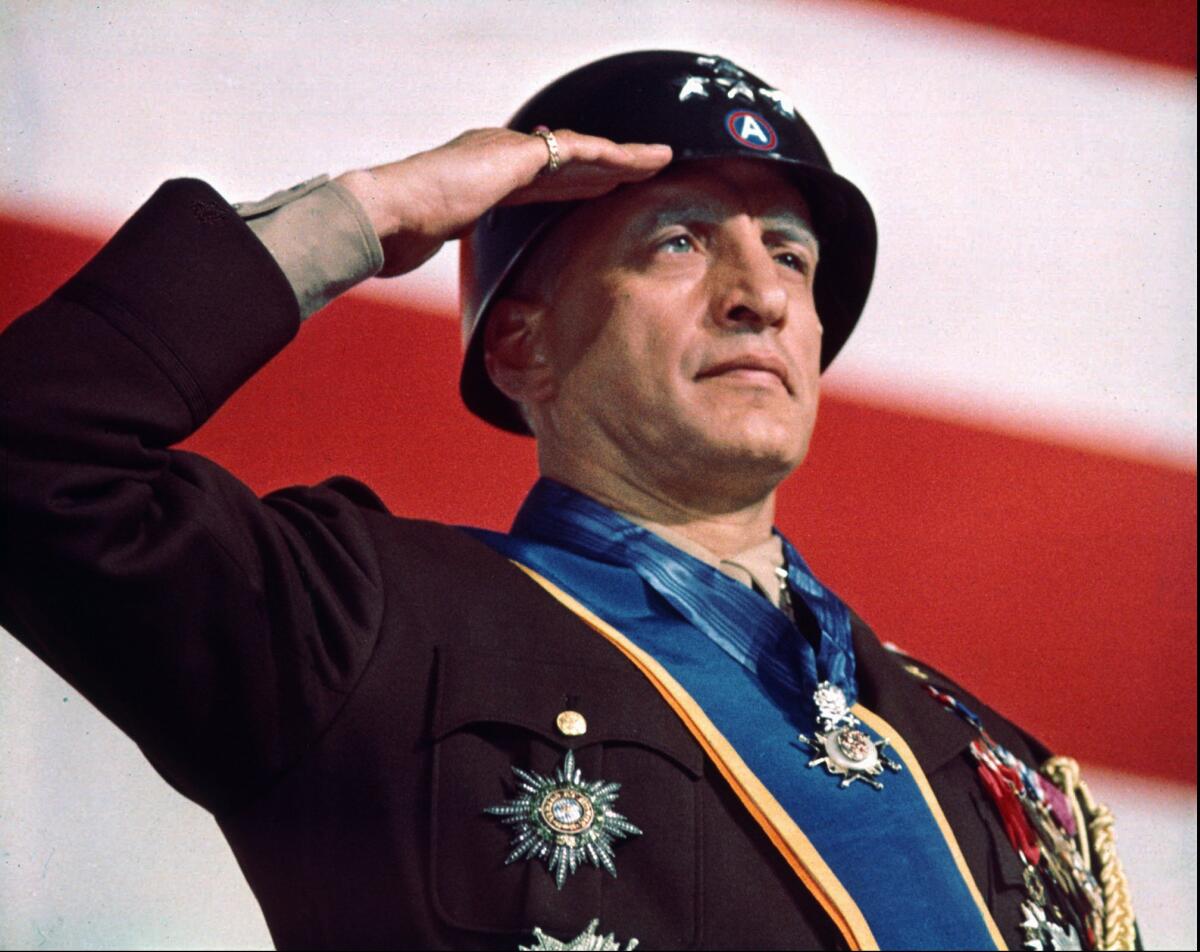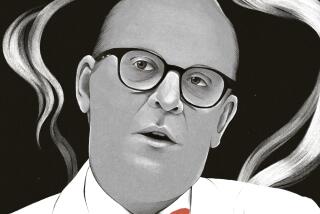From the Archives: âPattonâ features George C. Scott as âOld Blood and Gutsâ

Across the great width of the Dimension 150 screen stretches a 48-star American flag. It is not just vivid, it looks fluorescent, as if it were Day-Glo rather than a projected image.
From the bottom of the frame, seeming to emerge from both the flag and from time, dwarfed even by a stripe of the flag which thus appears to be even larger, a figure strides commandingly toward the audience. (The effect is strikingly three-dimensional, and this, too, is usefully symbolic.)
He is George C. Scott as Gen. George S. Patton Jr., glistening from helmet to boots, sashed and bemedaled, ivory-handled pistols snug at the hips, and he talks to us as to a theater-full of GIs just finishing combat training in Louisiana and about to embark for the war in Africa.
What he says is warrior talk â proud, patriotic, passionate, profane. A newspaper probably couldnât print it in full, but it is what the general said, to the last powerful cuss-word. The speech will thrill those for whom the glories of patriotic battle can never dim, and will chill those who do not think themselves less patriotic because they find war an ugly and unavailing abomination.
It makes a stunning beginning to a remarkable and complex movie which at last will give perfect comfort neither to the hawks nor to the doves. For âPattonâ (opening Wednesday at the Pantages) is a portrait, not an argument, and that is its strength and salvation.
The script, written by Francis Ford Coppola and Edmund H. North, follows Patton from his first appearance in the desert war of North Africa, through Sicily and Europe to the moment he is relieved of command of the Third Army. There are no flashbacks to the child Patton playing with war toys and only the most glancing references to the life which prepared Patton for his hours in history in World War II.
The movie thus preserves a strong forward momentum, yet we could hardly ask, I think, for a rounder or deeper understanding of an extraordinarily complicated and contradictory human being â a man capable of great tenderness and brutal insensitivity, a man who wrote poetry but handled difficult situations with the delicacy of a drunken stevedore and who indeed blurted his way out of command. He was a hard-headed and ruthless commander, but also a mystic who seems to have thought himself the reincarnation of warriors in a descent stretching from the earliest great battles which history records.
âI can smell a battlefield,â Patton says in one very moving scene, pulling off the road to a grassy field over which not the Nazis but the Carthaginians and the Romans had fought centuries before.
Great Scott performance
âPattonâ has, like âLawrence of Arabia,â done the near impossible by creating a finely detailed portrait despite all the tuggings towards simplification which are inevitable in the big-budget long loud roadshow production desperate to attract mass audiences.
As Patton, George Scott gives one of the great and unforgettable screen characterizations. And what is most impressive about it is its wholeness, its balance and restraint. With so flamboyant a personage to re-create, it wouldâve been possible to settle for flamboyance. But, working with a sensitive and perceptive man like Franklin Schaffner as his director, Scott gets beyond the flamboyance and lets us see the charm and honesty of the general â and also the frightening simplicity of his life-view.
âGod how I hate the 20th century,â Patton says, looking over the ancient battleground and well aware that he had been born out of his time, into a world gray with ambiguities and subtleties. Chewing cigars, grinning to reveal stained teeth, swearing and swaggering, Scott is wondrously good.
The centerpiece of the film is, of course, the famous moment when Patton, touring a field hospital, slapped a battle-shocked young GI, an incident which nearly cost Patton his whole career.
The movie helps us to see that the slapping incident was absolutely consonant with Pattonâs own proud notions of a warriorâs courage and stamina. But the movie also makes perfectly clear that the incident revealed an insensitivity to the realities of the human condition which approaches madness of a kind.
The only other character of duration and substance in the film is Karl Malden as General Omar Bradley, on whose autobiography the script is partly based. Malden as Bradley â steady, solid, compassionate, effective but wholly unflamboyant â serves as a double foil. He is the measure, by contrast, of Pattonâs erratics. And he is, I should think, the symbol of war as a filthy job which must nevertheless be done well but without joy.
Malden is excellent as the able and sympathetic man who comprehends Pattonâs enormous talent and his weaknesses as well. The part, inevitably, is pretty idealized, but Malden gives it warmth.
There are many of the familiar trappings of the traditional Hollywood war movie, and the best that can be said of them is that they may have been necessary compromises if the picture is to have anything like a mass audience. The battle action is very Hollywood, stylized as Indians falling from horses, and some is plain sloppy. In one scene, nervous stuntmen dropped the rifles and started their dying falls seconds before the killing shellburst exploded behind them.
The color is vivid and bright, with that awful perfection which defeats any semblance of reality. The exceptions are some of the winter scenes as Pattonâs men fight foul weather to get to besieged Bastogne.
On the other hand, there is one long sequence in which Patton walks around a battlefield the morning after an all-night struggle during which a German tank force decimated an American force whose machines had run out of gas. For once, a Hollywood war movie has made brutally clear that bodies in combat are torn apart, and bleed, and are burned and savaged, and putrefy. The scene is silent, and horrible, and true; it is of a piece with the accuracy and depth of Scottâs performance.
Personalized war
For once, also, the Germans speak German, with subtitles provided. The scenes themselves owe more to the conventions of the screen than to the truth of history. Yet the substance of these scenes enriches the portrait of Patton and it is the Germans who pronounce the epitaphs for him. Field Marshal Rommel, I think, remarks that Patton was the 16th-century man, and the young German officer adds that Patton was a pure warrior, and as such a hopeless anachronism.
âPattonâ is notably a literary movie about war, and one whose strength is primarily in its subjective moments rather than in its bombs and bombasts. Schaffnerâs considerable skill with the actors makes even the vignettes of the mighty seem something more than excerpts from son-et-lumière tableaux.
The movies naturally have always personalized war. And âPattonâ sometimes suggests that war was not between the Axis and the Allies but between Patton and Montgomery (Michael Bates) or Patton and the unseen Ike (trying desperately to keep all the Allies pulling in the same direction), or perhaps a kind of a motorized chess game between Patton and Rommel (Karl Michael Volger) as two fighters who knew each other better, sight unseen, than they knew most of their own comrades.
Yet the memoirs and accounts of World War II confirm rather than deny the filmâs personalizing of the war. War, like all of history, is the work of men. (What tends to grow impersonal are the boxcar numbers of the men who died, or were wounded or cannot even now be accounted for.)
Patton, classically, was a character who made statistics, and history. Overall he emerges from this film as a frightening character, for the conclusion is inescapable that his grasp on reality was dangerously compromised, not only by his surpassing vanity and arrogance but by his narrow and fanciful view of history and of his place in history.
And yet, stripped of his final command and strolling forlornly into the twilight (it is our last, symbolic glimpse of him), he is a figure of some little pathos. It was his thought to do great things and he did some of them. He also knew that glory was fleeting, although he perhaps did not expect it to be quite so fleeting.
Some of Jerry Goldsmithâs music, inevitably, is martial and customary. Elsewhere, and especially after the opening sequence, it is unexpectedly quiet and quizzical, moody and unsettling, singularly beautiful and singularly appropriate to the document to follow.
The movie was produced by Frank McCarthy, himself a reserve brigadier general. And I suspect that to an unusual degree the producer deserves credit not only for the fact that âPattonâ exists but for its tone. As a study of a military maverick within the military mind, it is at once judicious, inspiring and insightful, free of derived attitudes.
âPattonâ is surprising, commendable, engrossing â a most unconventional war movie masquerading as a noisy and competent conventional war movie.
More to Read
Only good movies
Get the Indie Focus newsletter, Mark Olsen's weekly guide to the world of cinema.
You may occasionally receive promotional content from the Los Angeles Times.










